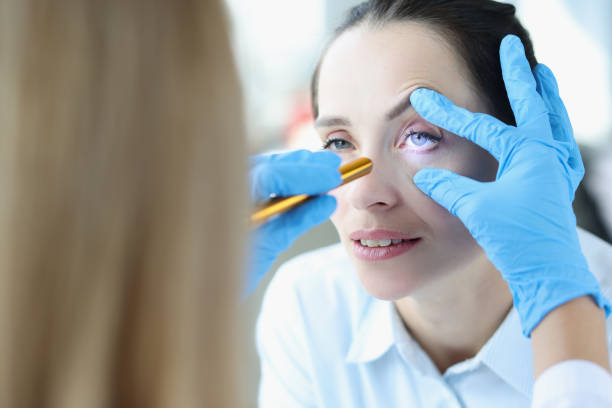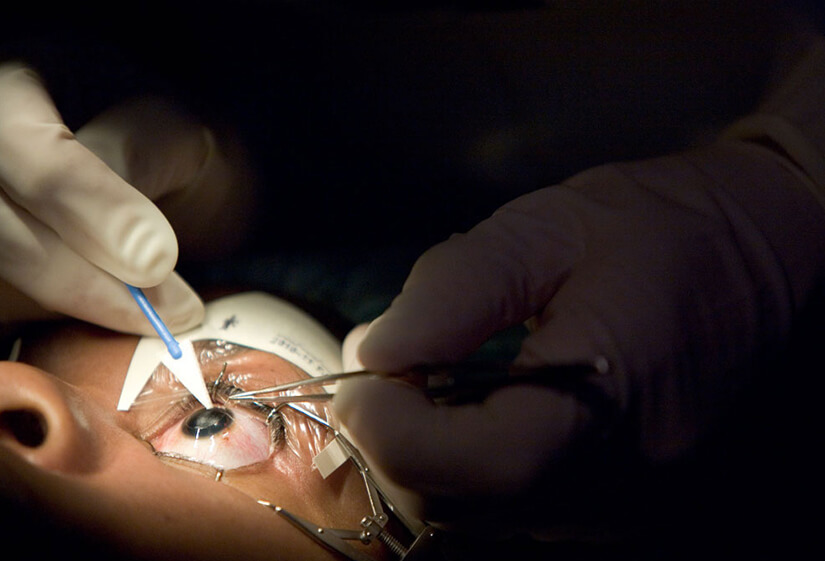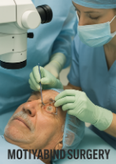General ophthalmology services refer to the medical and surgical care of eye disorders and diseases. Ophthalmologists, who are medical doctors specializing in eye care, provide general ophthalmology services to diagnose and treat a wide range of eye conditions.
Some common general ophthalmology services include:
- Comprehensive eye exams: A comprehensive eye exam evaluates the overall health of the eye, including the cornea, lens, retina, and optic nerve. It can detect various eye conditions such as cataracts, glaucoma, and macular degeneration.
- Refraction: Refraction is the process of determining the best corrective lens prescription to improve vision in people with refractive errors such as myopia (nearsightedness), hyperopia (farsightedness), astigmatism, and presbyopia (age-related farsightedness).
- Treatment of eye infections and inflammations: Ophthalmologists diagnose and treat various eye infections and inflammations such as conjunctivitis (pink eye), uveitis, and keratitis.
- Treatment of eye injuries: Ophthalmologists can provide emergency care for eye injuries such as corneal abrasions, chemical burns, and foreign body removal.
- Management of chronic eye diseases: Ophthalmologists manage chronic eye diseases such as glaucoma, diabetic retinopathy, and age-related macular degeneration (AMD).
- Cataract surgery: Ophthalmologists perform cataract surgery, a common procedure to remove the cloudy lens and replace it with an artificial lens implant.
Overall, general ophthalmology services encompass a wide range of diagnostic, medical, and surgical treatments for various eye conditions, and aim to preserve and improve vision and eye health.

The basics of general ophthalmology
Ophthalmology is the branch of medicine that deals with the study and treatment of eye disorders. Here are some basics of general ophthalmology.
- Anatomy of the Eye: The eye is a complex organ consisting of various structures that work together to enable vision. These structures include the cornea, iris, lens, retina, optic nerve, and various muscles.
- Vision: Vision is the result of light entering the eye and being focused onto the retina. The retina contains photoreceptor cells that convert light into electrical signals that are sent to the brain via the optic nerve.
- Common Eye Conditions: Some common eye conditions include refractive errors such as myopia (nearsightedness), hyperopia (farsightedness), astigmatism, and presbyopia; cataracts; glaucoma; age-related macular degeneration (AMD); diabetic retinopathy; and dry eye syndrome.
- Diagnosis and Treatment: Ophthalmologists use various tools and techniques to diagnose eye conditions, such as a visual acuity test, tonometry, ophthalmoscopy, and optical coherence tomography (OCT). Treatment options may include prescription glasses or contact lenses, medications, surgery, or a combination of these approaches.
- Prevention: Regular eye exams are essential for maintaining good eye health and detecting eye conditions early. Other preventive measures include wearing protective eyewear, maintaining a healthy diet and lifestyle, and managing chronic conditions such as diabetes.
- Subspecialties: Ophthalmology has several subspecialties, including cornea and external disease, glaucoma, retina and vitreous, pediatric ophthalmology, neuro-ophthalmology, and ophthalmic plastic surgery. These subspecialties focus on specific areas of eye care and may require additional training beyond general ophthalmology.
Overall, ophthalmology is a complex field that requires specialized knowledge and skills to diagnose and treat various eye conditions. It is essential to seek the advice of a qualified ophthalmologist for any eye-related concerns.
What are the common reasons for an appointment with an eye doctor?
There are several common reasons why someone might make an appointment with an eye doctor:
- Vision problems: This is the most common reason why people visit an eye doctor. They may be experiencing blurred vision, double vision, or other issues that affect their ability to see clearly.
- Eye infections: If someone has an eye infection, they may experience redness, itching, discharge, or other symptoms. An eye doctor can diagnose the infection and prescribe medication to treat it.
- Eye injuries: If someone has an injury to their eye, they should see an eye doctor immediately. The doctor can determine the severity of the injury and provide treatment to prevent further damage.
- Glaucoma: This is a condition that can damage the optic nerve and cause vision loss. An eye doctor can perform tests to diagnose glaucoma and provide treatment to prevent further damage.
- Cataracts: This is a condition that causes clouding of the eye’s lens, which can affect vision. An eye doctor can diagnose cataracts and recommend treatment, which may include surgery.
- Dry eyes: If someone has dry eyes, they may experience discomfort, redness, and sensitivity to light. An eye doctor can recommend treatments, such as eye drops or prescription medication, to help relieve the symptoms.
- Routine check-up: Even if someone doesn’t have any specific concerns, it’s still important to have regular eye exams to ensure that their eyes are healthy and their vision is optimal.
Where to find general ophthalmology services?
You can find general ophthalmology services in various places, including:
- Ophthalmology clinics: You can search for ophthalmology clinics in your local area through online directories or by asking for referrals from your primary care physician or friends and family.
- Hospitals: Many hospitals have ophthalmology departments where you can receive general ophthalmology services.
- Optometrists: Optometrists can provide basic eye care services, including vision testing, prescription eyewear, and some general eye health assessments.
- Online telemedicine platforms: Some telemedicine platforms offer online consultations with ophthalmologists who can provide general eye care services.
When looking for general ophthalmology services, it’s important to do your research to ensure that you’re choosing a reputable provider who has the necessary qualifications and experience to provide the care you need.
What are some common eye problems?
There are several common eye problems that people may experience throughout their lives. Some of these include:
Myopia (nearsightedness): This occurs when distant objects appear blurry, while nearby objects are clear.
Hyperopia (farsightedness): This is the opposite of myopia, where nearby objects appear blurry, while distant objects are clear.
Presbyopia: This is a condition that affects people over the age of 40, where the ability to focus on nearby objects diminishes.
Astigmatism: This occurs when the cornea is irregularly shaped, causing blurred or distorted vision.
Cataracts: A cataract is a clouding of the lens in the eye, which can cause blurry vision and may require surgery to correct it.
Glaucoma: Several eye conditions can damage the optic nerve and lead to vision loss. If you have any of these conditions, it’s important to see an eye doctor regularly to monitor your condition and protect your vision.
Dry eye syndrome: This occurs when the eyes do not produce enough tears, leading to dryness, irritation, and discomfort.
Conjunctivitis (pink eye): This is an inflammation of the conjunctiva, the clear membrane that covers the white part of the eye and the inside of the eyelids.
Strabismus (crossed eyes): This is a condition where the eyes do not align properly, causing one eye to look in a different direction than the other.
Amblyopia (lazy eye): This occurs when the brain favors one eye over the other, leading to poor vision in one eye.
It is important to see an eye doctor if you are experiencing any issues with your vision or eye health.
What general ophthalmology services do you need?
A general guideline, individuals may need ophthalmology services for a range of eye-related issues, such as:
- Comprehensive eye exams
- Diagnosis and treatment of eye diseases and conditions, such as glaucoma, cataracts, macular degeneration, and diabetic retinopathy.
- Prescription and fitting of eyeglasses and contact lenses
- Management of eye injuries and infections
- Refractive surgery consultations and evaluations (e.g. LASIK)
- Treatment of dry eye syndrome and other ocular surface diseases
- Treatment of strabismus (eye misalignment) and amblyopia (lazy eye)
- Management of vision-related issues associated with neurological disorders
- Vision therapy for individuals with binocular vision problems and visual processing disorders
It’s important to note that this is not an exhaustive list, and the specific services an individual may need will depend on their unique eye health needs and concerns.
How much does general ophthalmology cost?
The cost of general ophthalmology in Rupees can vary depending on several factors such as the location of the clinic or hospital, the experience of the doctor, and the type of services required. Here are some estimated costs for general ophthalmology services in India:
- Comprehensive eye exam: Rs. 500 to Rs. 2,500
- Contact lens exam and fitting: Rs. 1,000 to Rs. 2,500
- Prescription glasses: Rs. 1,000 to Rs. 10,000, depending on the frames and lenses
- Cataract surgery: Rs. 30,000 to Rs. 60,000 per eye
- Glaucoma surgery: Rs. 20,000 to Rs. 60,000 per eye
- LASIK surgery: Rs. 20,000 to Rs. 40,000 per eye
Please note that these are estimated costs, and the actual cost of ophthalmology services may vary depending on various factors. It’s always best to consult with your eye doctor or healthcare provider to determine the specific costs of the services you need. Additionally, some health insurance plans may cover some or all of the cost of ophthalmology services, so be sure to check with your provider to see what is covered.
How to schedule an appointment for general ophthalmology?
To schedule an appointment for general ophthalmology, follow these steps:
- Start by researching ophthalmologists in your area. You can do this by searching online, asking for referrals from your primary care physician or friends/family, or checking with your insurance provider for in-network ophthalmologists.
- Once you have identified a few potential ophthalmologists, check their websites or call their office to confirm that they offer general ophthalmology services.
- Next, call the office of your chosen ophthalmologist to schedule an appointment. Be prepared to provide your personal information such as name, address, phone number, and insurance information if applicable.
- If you are a new patient, you may be asked to fill out some forms prior to your appointment. You may be able to download these forms from the ophthalmologist’s website or the office may mail them to you.
- Finally, make sure to confirm the date and time of your appointment, as well as any instructions the ophthalmologist may have regarding preparation for your visit.
If you have any questions or concerns before your appointment, don’t hesitate to reach out to the ophthalmologist’s office for assistance.
What is an eye disease and what is an eye disorder?
Both eye diseases and eye disorders refer to conditions that affect the eyes, but they have different meanings and implications.
An eye disease is a medical condition that affects the normal functioning of the eye or the structures that support it. These conditions can be caused by genetics, infections, injury, or other factors. Some examples of eye diseases include glaucoma, cataracts, macular degeneration, and diabetic retinopathy.
On the other hand, an eye disorder refers to any abnormality or dysfunction that affects the eyes or vision, but it may not necessarily be a disease. For example, nearsightedness, farsightedness, astigmatism, and color blindness are all examples of eye disorders. They can be caused by a combination of genetic and environmental factors.
In summary, an eye disease is a specific medical condition that affects the eye, while an eye disorder is a more general term that refers to any type of abnormality or dysfunction related to the eyes or vision.
How to choose the right ophthalmologist for you?
Choosing the right ophthalmologist can be a crucial decision for your eye health. Here are some factors to consider when choosing the right ophthalmologist for you:
- Credentials and Experience: Check the ophthalmologist’s credentials and experience. Look for a doctor who is board-certified and has completed a residency program in ophthalmology. Additionally, check how many years of experience the ophthalmologist has.
- Referrals and Recommendations: Ask your primary care physician or friends and family for recommendations. They may be able to recommend a good ophthalmologist based on their own experiences.
- Specialization: Some ophthalmologists specialize in certain areas, such as cornea or retina. If you have a specific eye condition, you may want to consider an ophthalmologist who specializes in that area.
- Availability and Accessibility: Consider the location of the ophthalmologist’s office and their availability for appointments. It is also important to check if the doctor accepts your insurance.
- Comfort and Communication: Make sure you feel comfortable with the ophthalmologist and that they communicate well with you. A good doctor should be able to explain medical terms and procedures in a way that is easy for you to understand.
- Technology and Equipment: Consider the technology and equipment available in the ophthalmologist’s office. The latest technology can help with diagnosis and treatment of eye conditions.
Ultimately, choosing the right ophthalmologist depends on your specific needs and preferences. Do your research, ask questions, and choose a doctor who you trust and feel comfortable with.
Frequently asked questions:
- what is general ophthalmology?
A set of eye problem illustrations which include the optician’s test, examination, and diagnosis, the optometrist’s examination and diagnosis, and the ophthalmologist’s examination and diagnosis.
2. General ophthalmology services
The clinic provides routine eye examinations and screens for Cataracts, Glaucoma, Diabetic Retinopathy, Ocular Inflammation, Macular Degeneration, and eye injuries. In addition to monitoring eye health in patients with other disorders, the clinic also treats many other conditions that affect vision and ocular health.
3. Nearest ophthalmology clinic
Search the nearest ophthalmology clinic on google it will take you to the nearby ophthalmology clinic












